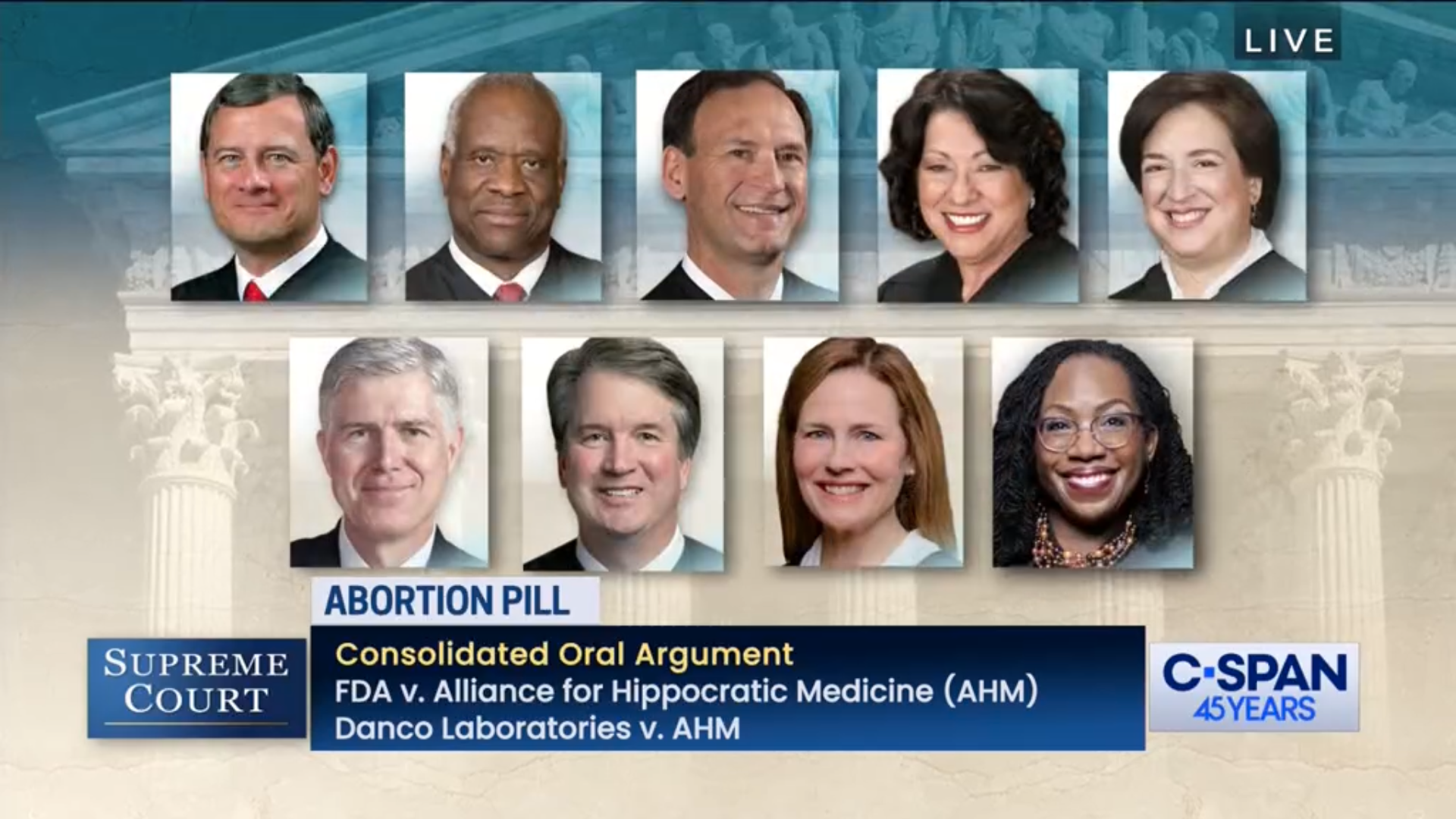In its first major abortion case since its ultraextreme majority overturned Roe v. Wade, the U.S. Supreme Court heard a lawsuit today that could imperil access to medication abortion.
Several justices questioned whether the anti-abortion groups suing the Food and Drug Administration have standing to do so. The high court is tasked with deciding, firstly, whether the litigating groups and doctors have the right to challenge the FDA’s regulations that expanded the use of mifepristone — the initial drug of a two-drug protocol to induce abortion.
The Freedom From Religion Foundation filed an amicus court brief asserting that the litigants lack standing to sue. Some anti-abortion physicians claimed at some point they might need to treat a patient suffering from unlikely complications caused by mifepristone, even though they have religious objections to the drug. The FDA has taken no regulatory action relating to these doctors that threatens their rights of conscience, FFRF contended. Its amicus explained, “In this instance, anti-abortion advocates seek to use the courts to limit access to a safe and effective medication used for abortion.” The anti-abortion doctors have sought to reverse-engineer a way to challenge the use of mifepristone, but those attempts fall well short of constitutional requirements.
The court will examine whether the FDA’s changes, beginning in 2016 to make the mifepristone pill easier to obtain, were “arbitrary and capricious.” The lawsuit in Alliance for Hippocratic Medicine v. FDA was filed by Alliance Defending Freedom, a Christian nationalist legal outfit. It represents anti-abortion advocates who judge-shopped U.S. District Judge Matthew Kacsmaryk, a Christian nationalist extremist whose nomination FFRF actively opposed, and who issued the ruling in April 2023 to ban mifepristone altogether around the nation.
The Supreme Court quickly decreed at the time that mifepristone would remain available under current rules until the litigation concludes. The 5th U.S. Circuit Court of Appeals last August then ruled to limit abortion medication to just seven weeks of gestation, instead of 10, and to ban telemedicine and mail-order shipments for abortion pills. At that point, the Supreme Court had no choice but to hear the case.
Medication abortion is extremely safe; the death rate is 0.0005 percent. For comparison, the risk of death from penicillin is four times greater and the risk of death from Viagra is nearly 10 times higher. More than 5 million U.S. women have used mifepristone to end pregnancies in the past 23 years, with a serious complication rate of less than 1 percent. Abortion medication accounted for 63 percent of all abortions in the United States in 2023, according to the Guttmacher Institute.
“Troublingly, it is a good thing that the Supreme Court has taken this case,” comments FFRF Senior Litigation Attorney Patrick Elliott. “The only way to undo the terrible ruling from the 5th Circuit was for the Supreme Court to take the case.”
Solicitor General Elizabeth Prelogar, arguing on behalf of the FDA, addressed the serious concerns regarding the doctrine of “standing” and the wide-reaching effects that this case could have if the court determines that the anti-abortion doctors indeed have the standing to attack the FDA’s regulations. Prelogar pointed out that the doctors’ theories “rest on a long chain of remote contingencies” and fail to demonstrate an actual concrete injury. FFRF’s amicus brief had echoed many of these same concerns, pointing out the extremely hypothetical and attenuated nature of the anti-abortion doctors’ supposed injuries.
The conservative justices were skeptical of the FDA’s findings and expertise regarding the safety of dispensing mifepristone via mail and telehealth. It appears that the justices, in particular Justice Samuel Alito, are willing to masquerade as medical professionals. The conservative majority was unwilling to press the attorney for the anti-abortion doctors on their lack of standing. Instead, the majority focused questions on tangential issues, such as associational standing (which permits a group to sue on behalf of its members). Disturbingly, Justice Neil Gorsuch asked Prelogar whether the court should revisit “offended observer” standing in the Establishment Clause context.
However, Justices Sonia Sotomayor, Elena Kagan and Ketanji Brown Jackson peppered Alliance Defending Freedom’s attorney, Erin Hawley, with questions regarding the doctors’ actual injuries and standing. At one point, Jackson asked Hawley to identify even a single instance where one of the doctors was unable to object to and refrain from performing or being involved in an emergency room visit resulting from mifepristone complications. ADF’s attorney seemed unable to directly and adequately answer Jackson’s question.
Surprisingly, Justice Amy Coney Barrett also questioned the doctors’ counsel regarding associational standing. Barrett repeatedly asked whether the lead organization, the Alliance for Hippocratic Medicine, had concretely demonstrated harm justifying associational standing in this case. On rebuttal, Prelogar hammered home the doctors’ lack of actual injury, stating “And here what is so telling is that respondents don’t have a specific example of any doctor ever having to provide this care in violation of their conscience. Instead, respondents have pointed to generalized assertions and declarations.”
Based on oral arguments, it looks like the justices are searching for a way out of the mess the 5th Circuit created. It’s anyone’s guess exactly how the opinion will unfold, but it’s clear that the ultraconservative majority is skeptical of the FDA’s arguments. Will the court fashion an escape hatch for itself that allows it to handle this case without harming its own interests and further galvanizing the public against it? We’ll find out by the end of June.
The Freedom From Religion Foundation is a national nonprofit organization with 40,000 members and several chapters across the country. Our purposes are to protect the constitutional principle of separation between state and church, and to educate the public on matters relating to nontheism.

